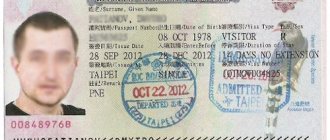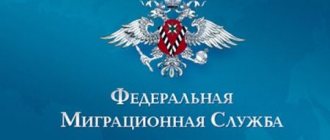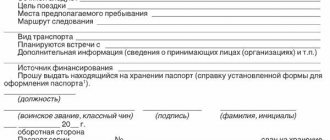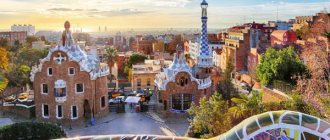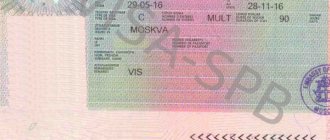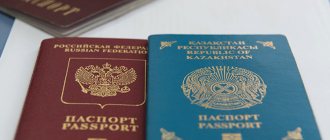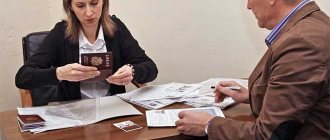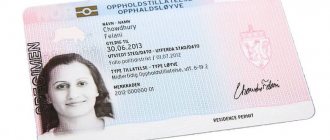Austria is a country with a population of almost 9 million people. It has developed industrial production, tourism, medicine, science and education.
Austria immigration
How do the Austrians do this and why do they succeed in so many things? How do Russians live in this country? Is the Austrian mentality difficult?
We will discuss all the issues and tell a few stories about the life of Russians in Austria.
How to immigrate to Austria?
If you want to go to any country in the world, the most important thing you need to have is desire. It is the desire and desire that will allow you to achieve your plans.
Immigrating to Austria is the solution for a secure and peaceful life. Every year the number of people wishing to move to this country is growing.
Persons invited to work, persons married to an Austrian citizen, refugees, businessmen, students and others can move to the country for permanent residence, obtain a residence permit, and subsequently the status of an Austrian citizen.
Consider cases of immigration to Austria:
Immigration to Austria for study (educational)
To immigrate through this method, the applicant must obtain a study permit.
Applicants are given the right to enter educational institutions in Austria on the basis of their certificate received in Russia.
The main advantage is that future students do not have to know German at first, but enter with an A1 level of English.
You can learn German after that.

Immigration to Austria on a work visa
To work in the Republic of Austria you must obtain a permit, regardless of whether you are a visa holder.
Various specialists can find work in Austria (from unskilled labor to rare and scarce specialties).
Of course, the easiest way to find a job is for those who have extensive professional experience. To obtain employment, you must obtain a special work visa and a work card.
The card must meet certain criteria (qualifications, education, age), on the basis of which points are awarded.
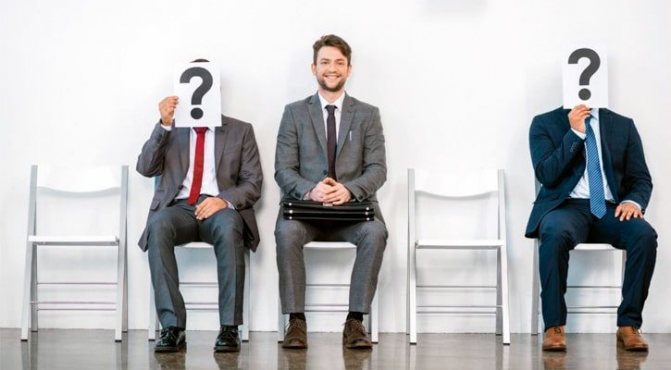
Business immigration to Austria
Many Russian and Ukrainian entrepreneurs have implemented their business ideas in Austria.
Most students who graduate from universities stay in the country and open their own start-ups.
Austria is a country with a stable economy. Opening or buying a ready-made business in one of the Austrian cities is, firstly, a minimum of bureaucracy, and secondly, it is easier to open a company here than in Switzerland or Germany.

Emigration to Austria. Refugee status
Due to the large flow of illegal immigrants, the Austrian Government, since January 2016, has amended the legislation to tighten conditions for refugees.
In particular, this is the establishment of a quota for the reception of migrants and the issuance of temporary refugee status for a period of three years. (2016-2019)
Only those refugees who have the formal right to request political asylum in the country will be allowed to cross the border.
Of course, refugees are granted rights to protection, temporary employment, and medical care.
This has nothing to do with Russian tourists. The procedure for obtaining Austrian visas and the timing of their issuance will remain the same.
Methods and conditions for obtaining a residence permit in Austria
Foreigners interested in how to go to Austria for permanent residence should know that this is only possible after receiving a temporary residence permit. There are several ways to obtain such a document. We will tell you about the most promising and popular ones.
Employment
To obtain a residence permit through employment, you must enter into a 6-month contract with an Austrian employer. Then it must be extended to one year.
The residence permit will have to be renewed annually for five years, after which labor rights will be expanded. For a foreigner, there are two types of obtaining a residence permit through employment:
- work by invitation;
- engage in independent activities.
There are reasons for both types. An immigrant may be:
- key specialist;
- a qualified worker;
- a representative of a rare profession (lists change annually);
- a graduate of an Austrian university;
- researcher or scientist.
Note. Qualification is confirmed by passing a test, based on the results of which you need to score: 50 points - for a key specialist or owner of a unique profession, 75 points - for a highly qualified specialist.
Getting an education
To obtain a temporary residence permit, you can come to the country under a training program. Obtaining an Austrian education has the following advantages for an immigrant:
- knowledge of German is not required;
- The schedule for attending lectures at the university is free, so a student can work part-time while studying;
- relatively inexpensive education;
- doors are open to a graduate of an Austrian university almost all over the world (unlike Russian diplomas, Austrian ones are valued in all countries).
Marriage to an Austrian citizen
This way of obtaining a residence permit is the easiest , since it does not require traveling outside the state while on a tourist visa.
During your legal stay in Austria as a tourist, you have the right to marry an Austrian (citizen), and your residence status changes when you apply for a change in visa type.
To get married in Austria, citizens of the Russian Federation must provide:
- passport;
- birth certificate;
- a certificate of absence of another marriage in the home country or in another country;
- document confirming registration in Russia.
Attention! If you change your passport details when getting married, you must register in the country within three months.
Family reunification
Family members of an Austrian citizen can obtain a temporary or permanent residence permit.
To do this, you need to provide documents confirming the relationship and the consent of the Austrian citizen for the residence of the relative. The requirements for spouses and children are as follows:
- a married couple has lived together for at least five years;
- one of the spouses has been living in the country for at least four years, and their life together at this time is at least one year;
- one of the spouses has been living in Austria for more than three years; their life together at this time must be at least two years.
A child born on Austrian soil will receive citizenship status no earlier than after four years of permanent residence.
Business immigration
Opening your own business in Austria is only the first step towards obtaining a residence permit. It is necessary to confirm qualifications and ability to conduct business in the country.
This requires confirmation:
- education and qualifications;
- legal income on the account in the amount of 30 to 100 thousand euros;
- residential addresses in Austria;
- legal address;
- absence of dangerous diseases for society;
- no criminal record.
There are different organizational and legal forms for doing business in the country:
- Iinzelunternehmer is a private entrepreneur.
- Kommanditgesellschaft (KG) and Kommanditerwerbsgesellschaft (KEG) are limited liability partnerships.
- Offene Erwerbsgesellschaft (OEG) and Offene Handelsgesellschaft (OHG) are an unlimited partnership.
- Gesellschaft mit beschrankter Haftung (GmbH) is a closed limited liability company.
Business immigration to Austria for Russians has its advantages:
- Knowledge of the Austrian language is not required.
- Possibility of moving with the whole family.
- When doing business legally, the residence permit is renewed every two years, after five years a permanent residence permit is given, and after ten years the businessman will be able to apply for Austrian citizenship.
To start your own business you need:
- business plan;
- positive decision of the Austrian Chamber of Commerce;
- company registration;
- submission of the necessary documents for a residence permit.
Investments in the country's economy
This method is suitable for Russians who are able to invest 2 million euros in the Austrian economy or invest up to 8 million euros in a government fund.
There is also a simplified scheme: wealthy immigrants applying for Austrian citizenship can purchase real estate.
But in this case, they will need to confirm that they have a sufficient amount in their bank account to live in the country (about 20 thousand euros per person and about 10 thousand for minor family members).
The candidate needs:
- buy an apartment or house in Austria;
- have papers confirming the availability of sufficient funds;
- confirm the rental or purchase of housing with relevant documents;
- rent real estate in accordance with the laws of the country (for a long term);
- take out an insurance policy.
Each city in Austria has its own standards for living space. Apartments and rooms must be purchased or rented depending on the number of family members. In addition, a mandatory requirement for the applicant is knowledge of the German language at a level of at least A1 (confirmed by testing).
How much does an apartment cost in Austria? Real estate prices in this country are high: a square meter in new housing stock will cost 2-3 thousand euros. A large amount of money invested in real estate gives the right to apply for Austrian citizenship.
Medicine and education
Medicine in Austria is one of the best in the world. The country has a compulsory health insurance system, and every resident of Austria has the right to receive quality medical care.
Foreigners without insurance will not be able to obtain a residence permit.
They simply won’t give you a card until you bring it from your insurance company - a policy that covers all health expenses.
Insurance for a visa to Austria is an indispensable condition for Russians planning to visit this country for any period of time. It is included in the set of mandatory documents for submission to the Embassy for a visa.
As soon as you take out insurance in Austria, you receive a plastic Ecard - it’s like your ID when visiting doctors.
However, insurance from OÖGKK (a branch of the state insurance company) does not give you access to any doctor, any clinic or all examinations.
First you need to clarify whether the doctor or institution works with your insurance company.
In Austria there are public medical centers, there are paid centers, and many private practitioners who see their patients in their private offices or medical offices. centers
If you have a cold and want to stay at home for a couple of days, “rest up,” it just won’t work out that way. A doctor's certificate is required.
Therefore, you need to visit a doctor. Keep in mind that not all doctors work with specific insurance companies.
Therefore, first read about it online.
Another important point is what language the doctor speaks and what hours he sees you. Not all Russians speak German, but you can communicate in English.
The official websites of insurance companies list all doctors working under a specific insurance. There, in the information about doctors there is also data on language skills.
The doctor prescribes medications and sick leave for two days.
From information from those living in Austria, there is a slightly different approach to treating patients.
It is important to minimize the amount of drugs and medications and pay more attention to the body so that it can cope on its own.
The very meaning of treatment is “do no harm.” Perhaps doctors have their own logic - if you feed a person pills, then later they will stop working.
In Austria there is public and private health insurance. Their cost is almost the same, the only difference is the provision of different options.
Each federal state has its own department where you can apply for state insurance.
In most cases, the employer pays for the worker's health insurance.
Having insurance in Austria is necessary not only for your own safety, but also for renewing documents.
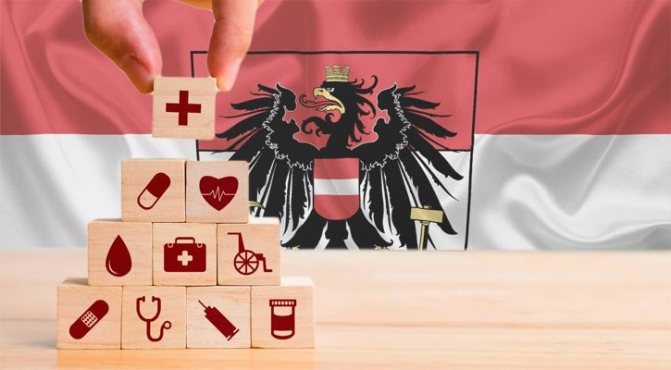
It is worth noting that treatment in Austria is free for any disease (with the exception of the dentist).
Medicines prescribed by a doctor are provided free of charge. Only tax is paid from 2 - 5 euros per package.
Operations are also performed free of charge.
A resident of Austria has the right to receive quality medical care.
Returning to the topic of the dentist. Yes, you can get a filling or denture, but it will be plastic. Or pay a lot of money.
Therefore, local Austrians go to the neighboring country, the Czech Republic, to have their teeth treated.
But universities in Austria are considered one of the best in Europe in terms of the quality of education.
The main advantage of studying in the country is a diploma that is recognized by international standards, and with it you can get any job, especially in Europe.
An important point that attracts Russian and Ukrainian applicants is the absence of entrance exams in many educational institutions.
Training is conducted mainly in German. But there are programs that are held in English.
And also, for admission itself it is not necessary to know German. It can be learned in preparatory courses.
The education system is structured in such a way that Students have the right not only to choose academic disciplines, topics of coursework and dissertations, to set deadlines for passing exams, but can also choose their own examiner.
The cost of studying at public universities for citizens of third countries (Russia, Ukraine, Belarus, Kazakhstan, etc.) is 745 euros per semester.
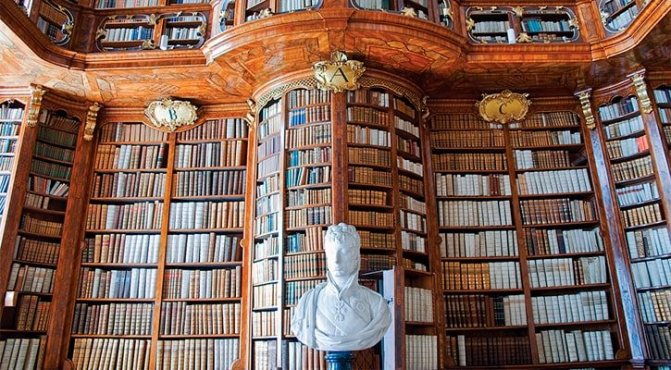
Moved: how to live in Austria?
07/10/2018 RUBRIC: Moved
Author: Yarik Zorka
71168
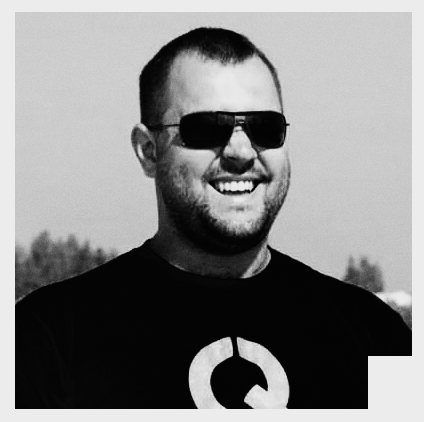
2.5 years ago Yarik Zorka from Kyiv and his wife Oksana moved to Austria. Yarik writes detailed notes about life in this small mountainous country in his Telegram channel. And especially for 34travel, he spoke about the preparation of documents, adaptation, local customs and the advantages of moving to Austria.
Preparing to move
In Kyiv we had a comfortable life with jobs, cars, apartments and other attributes of confidence in the future. It cannot be said that we were leaving something or somewhere in particular. But we traveled a lot around Europe by car, and when Oksana had the idea to work in her medical specialty in some other country, we remembered Austria. We can say that we chose this country to move to by chance.
About two years passed from the bare idea to the moment when we had learned the language to a certain level, saved up money and arrived in Mozart’s homeland with a clear plan. We received student visas because this is the easiest way to get a foothold in the country. Studying again is difficult and expensive, so we chose the path of confirmation (nostrification) of our Ukrainian diplomas - medical and legal. We didn’t have any job or other tangible prospect without at least one diploma, so we left, one might say, for nowhere.
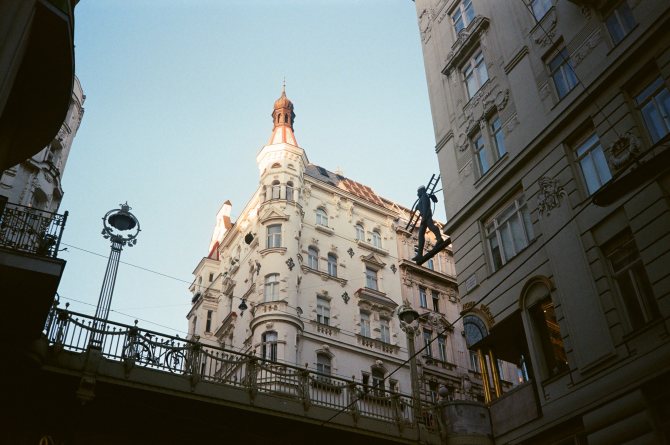
Documentation
Before you receive your first one-year residence permit, another 2 to 6 months of agonizing waiting will pass in your home country. We first submitted the entire pile of translated, certified and apostilled documents to the Ukrainian Embassy of Austria. There they were transferred further and later a decision was made on the basis of which a visa was issued to travel to Vienna to obtain a residence permit. In 2015, there was no visa-free regime, but now Ukrainians can bypass the embassy (Belarusians and Russians will still have to go to the embassy - editor's note). The processing of visa documents cost us €120.
If we talk about a student residence permit to confirm a diploma, then even before the embassy you need to show your diploma at an Austrian university and submit documents for entry along with the payment of € 150. Not all universities engage in nostrification, and it is not easy to prepare all the documents correctly - in Austria there are the most brutal bureaucrats and literalists. It may happen that you will have to visit Austria more than once or twice before successful enrollment.
Austria is a civilized and developed country where everything happens according to laws and rules. True, sometimes there are too many laws and rules and it’s difficult to understand on the spot. Another problem is language knowledge. And everything, from everyday issues like renting an apartment to obtaining a residence permit, takes place in German. In general, at first you get serious stress from the abundance of new information and many incomprehensible moments.
“Without a job and a credit history, the chances of officially renting more or less acceptable housing for adequate money are almost zero”
Housing
The most important and expensive moment when moving is housing and, as a result, registration. And the Vienna housing market, where there are a lot of migrants, is terribly overheated and unfriendly for renters. Without a job and a credit history, the chances of officially renting more or less acceptable housing for adequate money are almost zero. Our acquaintances, luck and perseverance helped us. So we got an apartment for €600 on the ground floor (by our standards, the first) of an apartment building, and for about six months we didn’t see the sun, because the windows faced a concrete wall.
Banking and medical services
Next, we needed to open an account where to put our savings. Austrian banks are quite wary of citizens of countries that are not members of the European Union and at the same time bring about € 10 thousand in cash to deposit into their account. I had to explain that these were funds honestly earned in my homeland, since I was an entrepreneur. Servicing an account in one of the top banks in the country costs only € 5 per month.
In Austria there is insurance medicine, so you can’t survive here without expensive insurance. Now for students it costs around €120 per month. If you are a young student, then after six months the insurance begins to take effect in full force, and everything is fine. But we were already over 30, so our economy insurance didn’t cover almost anything, and we tried not to get sick.
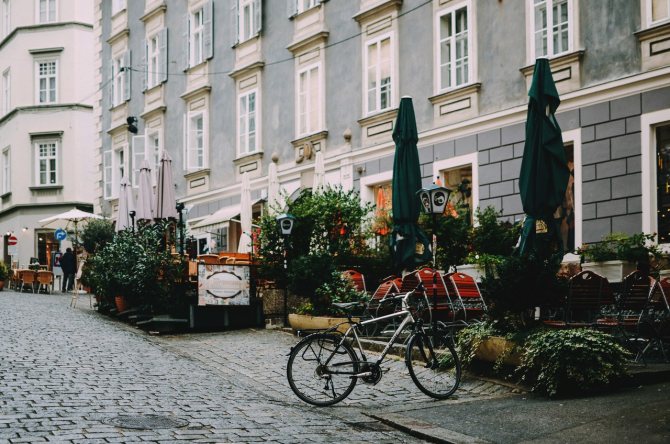
Local customs
The mentality of the Austrians is very different from ours. And along with the great difference in all processes in the country, this is, in fact, a different world. To this day we have not been able to establish any close contacts with the locals. But foreigners are actively making friends with the same “commoners.” Our friends now are Italians, Kazakhs, Bulgarians and Czechs. The attitude of the indigenous population towards guests from different countries is good if you behave within the law and do not hang on the neck of the state. I have not experienced any biased or obviously negative attitude during my entire time here. Yes, in emigration government agencies everything can be tough, but this is because people are very different and not all have good intentions.
Just when we arrived in Austria, the topic of refugees from Syria was in the first place. Demonstrations and concerts were held in the city center in support of migrants from the east, and the Austrians collected money, clothing and provisions to support the residents of the camps. But now all migration options are becoming stricter, and the country is no longer as welcoming to new arrivals as it was 2-3 years ago.
Life
After six months of our life in Vienna, Oksana completed her studies and received confirmation of her diploma. She found work as a doctor in the Austrian province, which is why we moved from the capital first to one small town in Lower Austria (like the Vienna region), and a year later to another, closer to the Czech Republic.
At first, the idea of leaving one of the best cities in the world according to various ratings in favor of a small village with a population of 10 thousand seemed unthinkable to us. We were not very optimistic, realizing that we were voluntarily giving up our newly established life in Vienna. But literally six months later we realized that with such a developed infrastructure (high-speed roads and railways), the effect of remoteness has almost no effect on our lives at all. On the other hand, we are also at a safe distance from civilization, excitement and stress.
Now we travel a lot by car in Europe, because it is small and comfortable for travel. The nearest international airport is about 200 kilometers away. It’s just a day’s journey to my native Kyiv by car or a couple of hours by plane. Relatives and friends visit us quite often, and we are very happy about it.
The high standard of living and the almost non-existent stratification of society into rich and poor makes the life of ordinary people in this country very comfortable. There is no widespread desire to get a higher education (but it really plays an important role here, only it is many times more difficult than in the homeland), and the majority of the population works in ordinary low-skilled positions, receiving decent wages (the minimum salary here is € 1,360) and the pleasure of life outside the workplace.
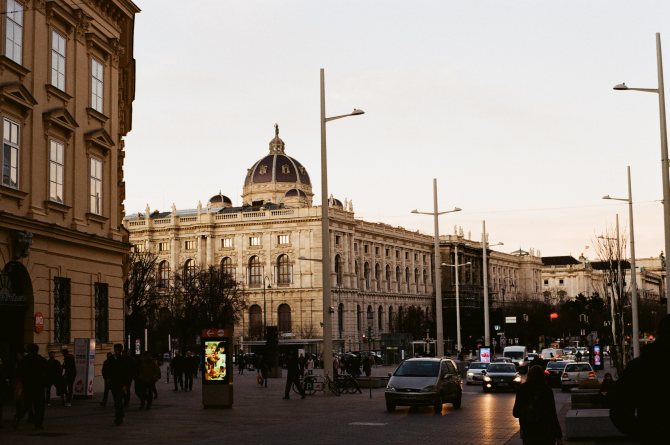
Environment
The Austrians themselves are kind, sympathetic and hardworking people. Contrary to the common misconception about the lack of a sense of humor among locals, cheerful and smiling people live in Austria. If they didn’t smile at you, and you didn’t smile back, this is rather some kind of anomaly. But Austrians respect the rules and will definitely reprimand you if you do something wrong. Despite the almost complete absence of solid fences, the right to private property is one of the fundamental ones here.
The country has a comfortable climate, which is not much different from the Ukrainian one. It is hot in summer and quite cold in winter. The difference is felt in the mountainous area (there is a lot of it here). Heavy snowfalls and mountain roads force you to be careful and make adjustments to logistics in winter. In our city, on a hill between the mountains, summer is comfortable and rarely hot, but in Vienna it was scorching hot for a couple of months in the summer. Late spring and summer are the ideal time to travel around the country.
Personal impressions
The country will be comfortable if you are ready to change, learn a fairly complex language and get a profession useful to society. The price includes either highly qualified personnel (doctors, IT specialists, engineers) or blue-collar professions (mechanics, carpenters, builders). All unskilled jobs are almost always occupied by locals, and it will be difficult to get a job here without a European diploma and a sought-after profession.
I don’t want to throw loud words about the uniqueness and ideality of the country, but if there was also a sea (it’s a 7-hour drive from our house), then I don’t even know what could compare with it. It is very beautiful here, diverse nature, excellent safety, powerful medicine and good people. There are, of course, disadvantages, but, in our opinion, there are many more advantages. There is nothing ideal in our life, but Austria strives for the absolute.
“I don’t want to throw loud words about the uniqueness and ideality of the country, but if there was also a sea here (it’s a 7-hour drive from our house), then I don’t even know what could compare with it.”
Photo: Lena Averina, Ekaterina Rybacheva, Margarita Mukhamedova, Kristina Ponomareva
Tags: Austria, Vienna
71168
How to get a job in Austria?
To come to Austria for the purpose of work, you must obtain a work visa. Both specialists and persons without special education can work in the country. For this purpose, a point system was developed that reflects the parameters of an employee.
An ordinary worker can receive 800 - 1,000 euros per month.
If you have higher education and work experience, then the average salary will be 2,000 – 4,000 euros per month. It all depends on qualifications and professionalism.
You need to submit documents for a work visa at the Austrian Embassy in your country.
The main documents include the following:
- Questionnaire
- International passport and Birth Certificate (with certified translation and apostille)
- Photograph (45x35mm)
- Apartment rental agreement in Austria
- Medical insurance
- Proof of solvency (bank/work statement, etc.)
- Invitation from employer
One more thing about work. If, for some reason, you are not satisfied with management, then no grounds are required for dismissal.
It is enough to look at the manager from the “wrong” angle, and they will tell you that you are not suitable for us.
This can only be challenged if there were five or more employees being fired.
But the good news is that Austrians have 13 and 14 salaries, which supplement the family budget.
The procedure for obtaining permanent residence in Austria
After a foreigner has lived in the republic with the status of a residence permit for 5 years and during this period has not been seen in supporting extremism, assisting terrorists, or in administrative offenses, or has a criminal record, he can take further steps towards legalization. This procedure is similar in all EU countries. Moving to Austria for permanent residence from Russia requires going through the stage of a temporary residence permit, after which the applicant must collect papers for the next step. They must be submitted to the migration police of the republic.
Required documents
What certificates and other papers must be submitted to an applicant from Russia?
- Petition.
- International passport.
- Photo 3.5 x 4.5 cm.
- Confirmation of housing availability.
- Certificate of income.
- Certificate of knowledge of the state language.
- Health insurance policy.
- Diploma or certificate of education received.
- Documents confirming the residence permit status.
- A document indicating no criminal record.
Depending on the reason for the move, the list of documents to be submitted may be supplemented with other certificates and certificates.
Cost and processing time
To obtain permanent residence you must pay a special fee, the amount of which varies depending on the grounds for acquiring the status. The periods for studying applications are different, since they depend on the applicant’s existing right to stay in the republic and the reasons for his move to Austria. An application for permanent residence can be studied from 3 to 6 months, so a foreign citizen should submit it no later than six months before the end of the existing status.
Features for pensioners and minors
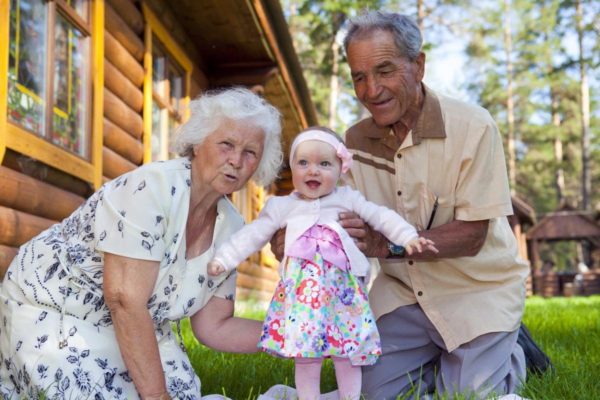
Given the high level of social security and medical care, the Alpine Republic is especially comfortable for retirees. There is no resettlement program in the state for this category of foreigners. Therefore, an ordinary elderly person with a low income level is not provided with preferences when obtaining permanent residence.
But if a person is wealthy, he can take advantage of the country's relocation program for investors. Immigrants submit papers confirming the availability of Russian pension payments, since they have the right to retain them. To do this, you need to write a corresponding petition to the diplomatic mission of the Russian Federation in the host country.
Minor children receive status together with their parents. To do this, they must additionally present their birth certificates, international passports, and photographs. If a child was born into a family where the mother or father is a citizen of Austria, he automatically receives the indigeneity of this country.
Is it possible to drink tap water?
Tap water is safe to drink. It's not just clean, it's also very tasty. This is mineral water that flows from alpine springs, from the Vienna Woods.
Viennese people usually do not buy bottled water. The same water flows from the tap at home. In any restaurant or cafe you can ask for a carafe of water for free.
Most Austrians do just that. You will be served a glass of water with your coffee without even asking. And this will also be healing moisture from the famous Viennese water supply.
This also applies to water from city park fountains.
At sources with water that is not suitable for drinking, there is usually a sign “Kein Trinkwasser” (“Water not for drinking”) or a sign with a crossed out glass.
Drinking fountains on the streets of Vienna are used by both tourists and locals. They are placed on the streets during the hottest time of the year so that people do not have problems with thirst. Then the fountains can be removed until the next season.
The first Austrian water pipeline from mountain springs began operating on October 24, 1873 in the town of Schwarzenberg, and 15 years later almost every house in Vienna had a water supply system with high-quality drinking water.
And for almost a century and a half, water quality in Austria has only improved.
The protection of water resources and water quality in the country is controlled at the state level, and almost all water supply facilities are under the responsibility of the government.
According to information from the children's doctor, tap water in Vienna is clean and perfectly suitable for drinking.
About the composition of water is here: https://de.wikipedia.org/.
A resident of Vienna comments:
“Colleagues told me the following story about water in Vienna: there is a system of aqueducts that carry water from the purest mountain lakes to Vienna.
The Austrian emperor even bought these very lakes into the ownership of the city of Vienna, so that no one else could encroach on them from the rest of the lands.
The equipment through which this nectar flows into the city is cleaned almost every Monday. So here you can drink from the tap and not be afraid.”
(at the end of the story, a colleague with the love for Burgenland characteristic of many Viennese told me not to drink water in Burgenland under any circumstances, since there are no aqueducts to the cleanest lakes there, and in general Burgenlanders live there)
Reviews from Russians about life in Austria
Lyudmila Shelkopryad
I am delighted with life in Austria, with local traditions, local culture, with the Austrians themselves. For the most part, they are very nice and friendly people, ready to help in difficult situations. The only thing that bothers us is the huge number of migrants. Of course, I’m also visiting, but at least I work and study on my own. It would be nice if these people at least worked, and not just gave birth to children at the expense of the state. It's a shame that Austria is becoming as multicultural as America.
Mikhail Saratovsky
Still, how people treat you on the street, in the store, and in everyday life in general is very important. After all, a pleasant smile accompanied by a greeting can radically improve your mood for the rest of the day.
Yesterday I was asked “how am I doing” about 6 times. And it doesn’t “get boring” as many might think. It's really nice. It’s nice to answer that “everything is fine.” It's nice to greet people yourself. It’s nice to feel like you’re part of a society that doesn’t wipe you out, but lives with you.
How to sort garbage?
Waste disposal in Vienna is a complex system. Green technologies are, of course, very important. But it is equally important that the city resident himself understands: if you want cleanliness around, you don’t need to litter where you live.
Plastic in one container, paper in another. For residents of Vienna, sorting garbage is a routine matter.
“Children learn this at school. There is a special program in schools. Children are taught in a playful way how to sort garbage.”
But there still remains something that cannot be recycled and has to be burned.
About the creation of the architect Friedensreich Hundertwasser - the Spitellau waste incineration plant, watch the news story from Channel One: https://www.1tv.ru/n/321002
Some things are simply a shame to burn, and there are special places for them in Vienna at waste collection points.
Then they go to a special store.
How much do you need to live in Austria? Prices for food and utilities
There are many subtleties in the local Austrian mentality.
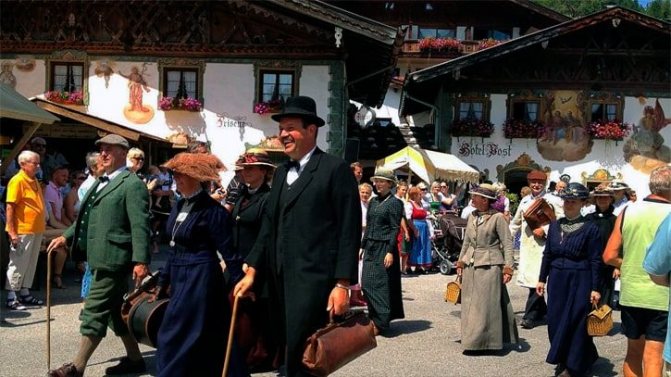
The main difference is that the system is based on the fear of losing money (fines, job loss, denunciations, etc.).
You have to live there to understand! There are many tricks that only locals know - food and clothing can be bought at a low price if you know where and when!
A tourist sees prices several times higher than those known to local residents.
Grocery prices in stores in Austria
| Chicken nuggets | 2 euros |
| Kefir | 0.79 euro |
| Cold cuts | 2 euros |
| Bread | 1.29 euros |
| Butter | 2.30 euros |
| Cottage cheese | 2.34 euros |
| Tomato juice | 1.50 euro |
| Cola | 0.79 euro |
| Cheese | 2.99 euros |
| Sour cream | 0.89 euros |
| Yogurt | 0.89 euros |
| cucumbers | 0.79 euro |
| Olives | 2 euros |
| Eggs – 15 pcs. | 2.89 euros |
It costs about 300 euros per person per month to buy groceries in Austria. Of course, it all depends on your preferences.
Communal payments
They consist of mandatory rent for an elevator, garbage removal, building insurance, repair fund, etc., and payment for individual services (electricity, gas, internet).
Depending on the size of the house, the number of residents, and the season, monthly utilities average 150 - 250 euros.
| Rent | €80 – 150 |
| Heating (price depends on which option is in your apartment: central system, individual gas or electric heating). But in all cases, you can control costs by adjusting the room temperature. | Average monthly fee – €10 – 40 |
| Electricity and gas: prices depend on the region, supplier and tariff. | In Vienna, 1 kW of energy costs €0.23 with economical consumption (up to 2,000 kW), and 1 kW*hour of gas (up to 8,000 kW*hour per year) costs €0.08. That is, if you consume 2,000 kW per year, on average you will pay €40 per month for electricity. |
| Cable TV and Internet | €35 — 40 |
| Water, sewer and garbage removal are often included in the rent. | On average, the annual water bill for a typical family is €200 per year, and the sewer bill is €270. |
Flat rent
Real estate in Austria is expensive. Even local Austrians can live “their entire lives” in a rented home without ever buying their own property.
You can rent housing in Austria in the following ways:
- Rent a room in an apartment. This option is most often used by students. The amount of the “share” in the total budget is from €250 – 300.
- Rent separate housing. In this case, prices vary greatly depending on the area of the city and the size of the apartment.
For example, if you rent an apartment up to 50 sq.m., the cost per square meter will be from €13.5. In the Simmering area up to €42.4 in the center.
A one-room apartment can be rented from €500 – 600 per month.
Apartment purchase
The real estate market in Austria is replete with a variety of offers for the sale of luxury and cheap apartments, business class apartments.
Prices vary from 1,600 to 13,000 euros per sq. m. m.
For example, you can buy an apartment in Vienna for either €100 thousand or several million euros.
Vienna is divided into 23 districts https://ru.wikipedia.org/, each of them has its own characteristics.
The city center (First District) is considered the most expensive area; prices for apartments here start from €10 thousand per square meter.
Budget housing can be found in the 21st, 22nd districts, as well as in a number of neighborhoods in the 10th and 15th districts.
Resale prices here range from €2,500 - 3,500 per sq. m. m (apartments requiring renovation) up to €3,500 - €5,500 per sq. m. m (apartments after renovation).
New housing is more expensive - €4,500 - €7,500 per sq. m. m.
Salzburg is the fourth largest city in Austria. The cost per square meter here is lower than in Vienna - from €2-3 thousand per sq.m.
This is one of the most expensive regions in Austria. Real estate in the mountains is classified as elite and in demand.
The cost of real estate here is comparable to Vienna - from €5 thousand per sq.m., and reaches €10-12 thousand.
Taxes
When purchasing real estate in Austria, the transaction is registered with the tax authority and at the same time a tax is paid, which is 3.5% - this is a tax on the acquisition of real estate.
They also pay land cadastral tax - it is 1% of the value of the property.
Immediately after paying the tax on the acquisition of real estate, the transaction can be registered - this is done in the local land court.
Do not forget that when purchasing real estate in Austria, the costs will also include the cost of notary services (up to 5%) and a real estate agency (no more than 3.6%).
For those property buyers who are not citizens of the European Union, there is another fee of one thousand euros.
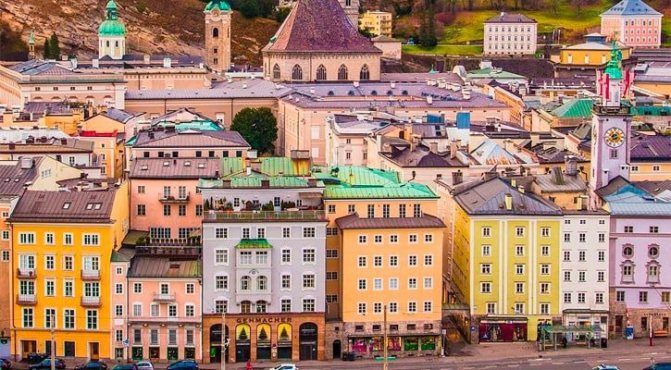
Ways to immigrate to Austria
Austrians have great respect for the law and illegal immigrants have almost no chance. All of them will be discovered and reported to the police by law-abiding citizens of the country, the consequences for illegal immigrants are very sad - they will have to forget about developed European countries for many years, entry there will be prohibited.
There are the following ways to emigrate to the country:
- obtaining political refugee status; family unification;
- obtaining a permanent work permit;
- study and education;
- permanent residence permits for businessmen with deposits or real estate in the country.
Let us consider in more detail all of the above methods of obtaining a permanent residence permit in Austria.
Obtaining refugee status
Those people who have received persecution in their country can emigrate in this way. The Austrian elite treats such persons condescendingly; they provide them with a passport, as well as legal assistance. Refugees are provided with food, medical care, and even temporary work.
Family reunification
It's not as simple as it might seem at first glance. The reason for the difficulties is the large number of fictitious marriages. Now you can apply for family reunification only if:
- the foreign spouse resides in the country for at least three years, and the marriage lasts for at least two years;
- the foreign spouse has lived in Austria for four years and the marriage lasts for at least a year;
- the marriage lasts more than five years.
In any case, you should have evidence of joint residence and common property. A child born to foreign spouses legally residing in Austria receives citizenship after 4–6 years.
Employment in the country
An Austrian company can invite an employee to work at its place. Usually they invite unique specialists needed by the republic. Rare specialists are also needed; the list of them is determined every year. For example, nursing staff, milling operators, turners, etc. After 10–15 years of proven experience, you can apply for citizenship.
The receiving party handles the paperwork. The employee needs to provide a general package of documents.
Education
You can get higher education in Austria at more than 30 universities. Some of them are private, some are public. You do not need to pass entrance exams to get admitted. A student studying at a university can receive a resident card in a shorter period of time - 3 months. The training will also give you the right to work (up to 20 hours per week). Tuition fees are relatively low: around 800 euros per semester.
For this method of moving you need:
- Apply to one of the Austrian universities.
- Receive confirmation of enrollment.
- Pay for training.
- Arrange for rental housing.
- Provide a certificate from the bank indicating that you have 85,000 euros in your account.
Running your business
In Austria, such sectors of the economy as special-purpose machine building, metalworking, automotive, and chemical industries are developing remarkably well. But agriculture or forestry in this country are not attractive sectors for businessmen. For wealthy foreigners, residents of Russia or Ukraine, many prospects for doing business open up. Very often, Austrians sell their well-established family business, or rather, they are looking for investors willing to invest money in their business.
Also, many residents of Austria do not want to promote the business of producing confectionery products and various workshops. And this could be a real godsend for wealthy Russian or Ukrainian citizens; immigration to Austria seems possible for them.
Investing in the country's economy
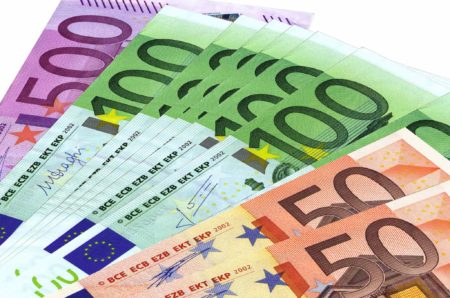
The fastest method. The only thing left to do is to have 2 million euros and deposit them into the account of a special Government fund. Based on the document, citizenship is immediately issued. Another advantage of this method is that there is no need to renounce your first citizenship, although this condition is considered mandatory for all other methods. Austria legally prohibits dual citizenship. But here, too, there are state quotas - there are too many applicants for a small European country. The recipe for increasing the likelihood of winning is simple: more money contributed to the fund means a higher chance of obtaining citizenship.
Immigration for people living on deposits
Emigration of foreigners from other countries is suitable for those individuals who are wealthy people who have a decent amount of money to support themselves and their entire family. In order to go to live in this European country in this way, a foreigner needs to have his own house, apartment in Austria, as well as insurance and a statement from an Austrian or other bank located in the EU.
- availability of real estate in Austria;
- all family members must have health insurance. It is quite expensive; not all native Austrians can afford such luxury;
- for each adult family member there must be at least 85 thousand euros in an Austrian bank account, and for a child at least 45 thousand euros.
There is no specific fixed amount that should be in a person’s account. This amount is calculated taking into account the number of family members. For an adult in 2021 it will be 86 thousand euros, and for a child - 45 thousand euros.
One way ticket. Life of Russians in Austria
Austria is an amazing country. Cultural, educated, multinational and preserving its traditions. Many stories of Russian immigrants are proof of this.
Come to Austria and stay. Live the life of an Austrian.
Is it possible to? The answer will be yes. And let's say more, Austria changes people. And it changes for the better.
As examples, we offer you real stories of Russian immigrants.
Story No. 1
I can observe such changes in myself and in my attitude towards the world around me, after two years of living in Austria. A country with a very rich and complex history often gives you a lot to think about. But the most important and useful thing is that it is easier to understand what is important to you and what is secondary. And this greatly changes me and my perception of life.
I learned to listen to my interlocutor. Not always and not in everything, but I am making great progress. By “listening” I mean behavior that could be characterized by the phrase “trying to hear what the person is telling me and understand him.”
I learned to separate the concepts of “Motherland” and “state” . For me these are very different concepts in essence and meaning. I believe in Russia and am proud of my Motherland, its people, history, culture, soul. I understand that I will forever remain a Russian person, regardless of where I live tomorrow. I have a slightly different – critical – attitude towards the “state”, and I believe that my Motherland does not suffer from this.
I learned to count my time. I realized that time is more valuable than money saved. You realize this very well when there is no time, but there is money. You understand even better when both are missing.
I realized that I am a nationalist at heart, and now I am fighting against it.
I realized that education is not necessary for survival . Now it has become easier for me to understand why many people in my homeland dislike educated people so much.
I realized that rest is an important part of life. That you can and should relax and enjoy life. That this should be learned and that relaxation cannot be an evening “in the kitchen” with friends, where you discuss problems and ways to survive.
I realized that work is a part of life, and not the meaning itself. This is difficult to understand when you are in a company of people trying to survive. In such an environment, everyone expects a feat, everyone accomplishes a feat, everyone expects a feat from you. The feat is not a strategy, but rather a miracle. Counting on a miracle is like counting on chance.
Story No. 2
My family lives in Vienna. Mom has been living here for 10 years. She married an Austrian. He speaks better than in Latvia, definitely.
My brother, he works as an electrician in Vienna, receives 2000 EU per month + medicine + 6 weeks of vacation, not including numerous Austrian holidays (he started as an electrician’s assistant, gained experience in a local company and defended his diploma from the Riga Technical School).
Story No. 3
The food here is very tasty. And the bread - mmmm... There is nothing like this anywhere else! Well, who knows, the Austrians know how to bake golden brown bread with a crispy crust! No Borodinsky was even close by!
Salaries here are paid not 12, but 14 salaries a year. I am writing about full-time and clean: a nurse has about 1600 euros, a teacher from 2000 euros, a supermarket cashier 1000 euros, a cleaner 900 euros, an ordinary office worker 1500-1700, a specialist from 2000 euros. Doctors (employed at the hospital) no less than 3,000.
Pensions (who have worked full time all their lives) cannot be less than 1000 euros, often 1500-1800 euros. Pensions are also paid 14 times a year.
Work in Vienna is quite good, in the provinces it is somewhat worse. The better the qualifications, education and language, the easier it is to find a job. Anyone who can’t find a job means that something is wrong (either the language is bad, or the qualifications are low). No one I know has been unemployed for more than a couple of months.
The medical system is one of the best in the world in terms of quality and accessibility to all segments of the population.
Never mix Austrians with Germans, the Austrians will be very offended.
Remember, ALL those who whine “we are second class here”, “they don’t like us” or “everything is foreign here” - they simply could not learn the language, adapt and get settled. Unfortunately, there are many of them. My mother always admires Austria when she visits me, but she will never be able to live here, because at her age she will not be able to get used to a foreign country and learn the language, and without this, nothing makes sense.
Moving to Austria
I didn’t live in Moscow, so there were no direct flights to Austria. The cheapest and most convenient option was through the Czech Republic, from where you can then go to Linz on FlixBus (4 hours from Prague). Therefore, to everyone who doubts whether it is possible to enter another country with a national visa, I say “Yes!” There were no questions at the border, they just reminded me that I had a one-time visa.
Moving is not the end of the paperwork. You need to register at your place of residence, open a bank account, get local insurance and pick up a residence permit. By the way, fingerprints are taken (needed, even if you donated) and they charge 20 euros for it. The card itself is paid - 20 euros.
As for the university, there was no need to arrive in advance. For this purpose, an orientation week was organized for everyone. The secretariat offered free assistance in obtaining registration, residence permit cards, and obtaining insurance. I dealt with this myself.

